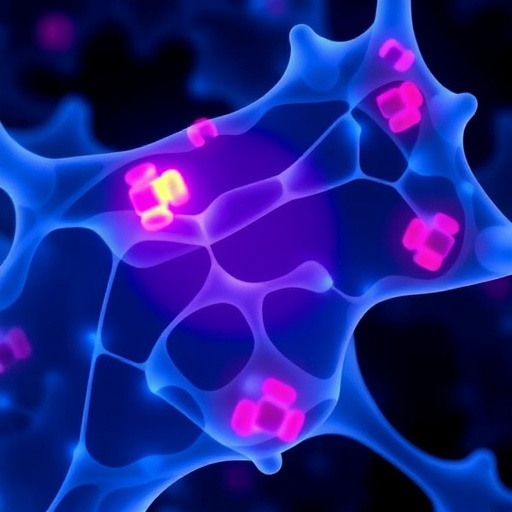In a groundbreaking study published in BioMedical Engineering OnLine, researchers have shed new light on the mechanisms driving bone loss during spaceflight and mechanical unloading. The investigation dives deeply into the cellular and molecular disturbances occurring in osteoblasts – the bone-forming cells – under conditions of simulated microgravity (SMG). This research elucidates the critical role of mitochondrial dysfunction and mitophagy suppression, unraveling potential therapeutic pathways to combat skeletal deterioration in astronauts and others subjected to prolonged unloading.
Bone health is critically compromised during space missions, leading to serious challenges for astronaut safety and mission success. Microgravity has long been observed to disrupt the delicate balance of bone remodeling, tipping the scale toward bone resorption and loss. However, while the clinical manifestations are well documented, the underlying cellular mechanisms remained elusive until now. The study places mitochondrial quality control via mitophagy—an autophagic process that clears damaged mitochondria—at the heart of osteogenic dysfunction induced by SMG.
The investigative team employed an innovative rotary cell culture system to emulate the effects of microgravity on cultured osteoblasts. This setup enabled precise modeling of the mechanical unloading conditions experienced in space, allowing researchers to monitor cellular proliferation, differentiation, and apoptosis in a controlled laboratory environment. To quantify these processes, assays including CCK-8 for proliferation, flow cytometry for apoptosis, and enzymatic staining for osteogenic markers were meticulously performed, revealing a stark suppression of osteoblast function under SMG.
Mitochondrial health was probed through a battery of complementary techniques. The study measured ATP production, which serves as a fundamental indicator of cellular energy status, alongside reactive oxygen species (ROS) levels that signify oxidative stress. They utilized JC-1 staining to assess mitochondrial membrane potential, a sensitive measure of mitochondrial integrity, and electron microscopy provided ultrastructural insight into mitochondrial morphology. The results were compelling – SMG induced mitochondrial swelling and disrupted cristae architecture, hallmarks of organelle dysfunction.
Central to the study’s novelty is the focus on mitophagy, specifically the PINK1/Parkin pathway, which orchestrates the removal of damaged mitochondria. Gene and protein expression analyses via qPCR and Western blot demonstrated a marked downregulation of mitophagy markers under simulated microgravity conditions. This suppression implies a failure in mitochondrial quality control mechanisms, leading to the accumulation of dysfunctional mitochondria within osteoblasts, thereby impairing their vitality and function.
In an exciting advance, the researchers explored the therapeutic potential of icariin (ICA), a small molecule known to influence mitochondrial function. Treating SMG-exposed osteoblasts with ICA partially restored mitochondrial parameters, including membrane potential and ATP content, and reactivated mitophagy markers such as PINK1 and Parkin. This intervention also ameliorated osteogenic marker expression and improved cell viability, demonstrating that targeting mitochondrial health could reverse some aspects of microgravity-induced bone cell dysfunction.
This study compellingly argues that defective mitophagy is a pivotal contributor to the osteogenic deficits observed under unloading conditions. Impaired clearance of damaged mitochondria not only compromises cellular bioenergetics but also enhances oxidative stress, driving apoptosis and halting the differentiation necessary for bone formation. Consequently, mitophagy emerges as a promising therapeutic target to mitigate bone loss not only in astronauts but potentially in patients suffering from immobilization-related osteoporosis or other mechanical unloading scenarios.
The research brings mitochondrial dynamics into sharper focus as central players in skeletal biology, particularly under atypical mechanical environments. The detailed mechanistic insights it provides help bridge the gap between observed physiological outcomes and intracellular events. Understanding how mitophagy impairment interplays with osteoblast dysfunction could pave the way for novel drug development strategies designed to sustain bone health in challenging conditions.
Moreover, the partial rescue by icariin underscores the value of small molecules in regulating mitochondrial quality control pathways. As a natural compound derived from Epimedium species, icariin has garnered attention for its multi-faceted bioactivity—including antioxidant, anti-inflammatory, and now mitophagy-modulating properties. Its functional restoration of mitochondrial integrity and osteogenic capacity under simulated microgravity highlights its translational potential for clinical applications.
Beyond its implications for space medicine, this study offers broader biomedical relevance. Bone loss due to disuse, aging, and disease shares mechanistic overlaps with microgravity-induced skeletal deterioration. Thus, insights into mitophagy and mitochondrial function could inform treatments for osteoporosis and other metabolic bone diseases affecting millions worldwide. The intersection of mitochondrial biology and bone metabolism is poised to become a fertile ground for future research and therapeutic innovation.
In summary, this pioneering investigation elucidates how simulated microgravity suppresses osteoblast function by impairing mitophagy and mitochondrial health. Through rigorous experimentation, the authors demonstrate that maintaining mitochondrial quality control via the PINK1/Parkin pathway is essential for osteoblast proliferation, differentiation, and survival. Their findings spotlight icariin as a promising candidate to counteract these deleterious effects, suggesting a roadmap for mitigating unloading-induced bone loss and enhancing astronaut health on long-duration missions.
As humanity prepares for extended space exploration, the burden of bone loss remains a critical hurdle. Studies such as this provide vital molecular clues and actionable targets, bringing us closer to effective countermeasures. Ensuring astronaut skeletal integrity will be crucial not only for physical health but also for mission success and future interplanetary colonization. This research marks an important step forward, demonstrating that by protecting the mitochondria, we may protect the bones—and ultimately, the explorers who rely on them.
Subject of Research: Osteoblast dysfunction and mitochondrial quality control under simulated microgravity
Article Title: Osteoblast dysfunction associated with mitophagy suppression under simulated microgravity
Article References: Xue, J., Wang, M., Liu, S. et al. Osteoblast dysfunction associated with mitophagy suppression under simulated microgravity. BioMed Eng OnLine 24, 113 (2025). https://doi.org/10.1186/s12938-025-01454-w
Image Credits: AI Generated
DOI: https://doi.org/10.1186/s12938-025-01454-w




